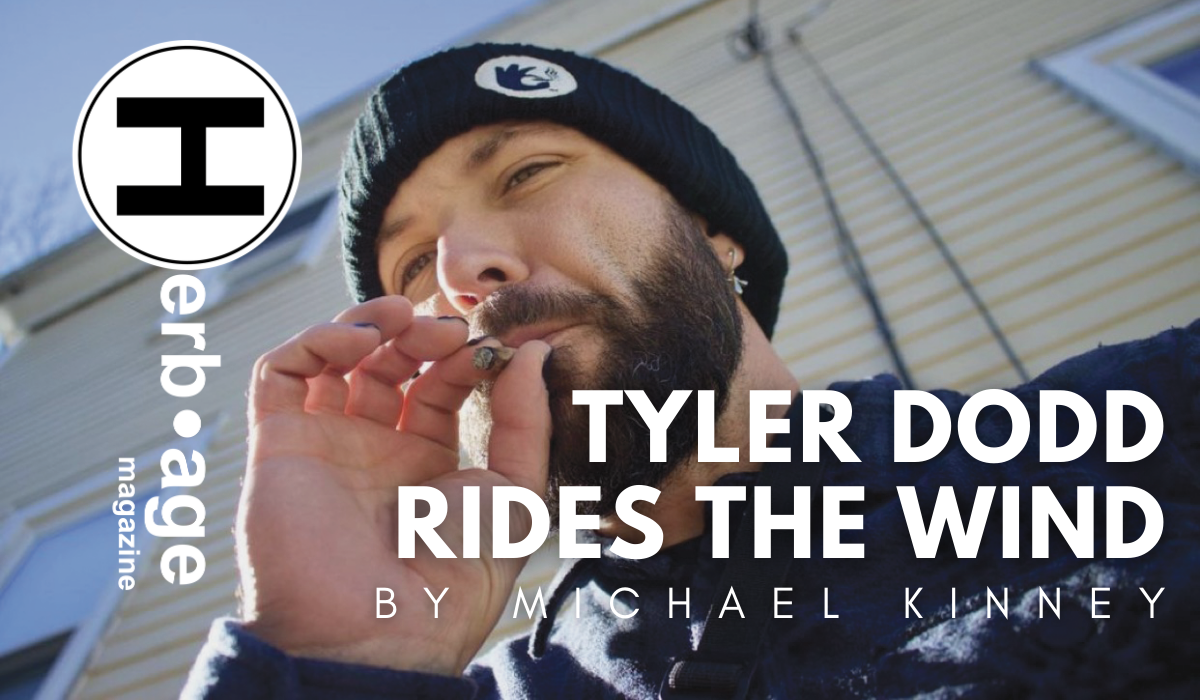by Michael Kinney
In 2020 Tyler Dodd found himself sitting face to face with boxing legend Mike Tyson in Los Angeles. At the time Tyson was training for his comeback exhibition fight against Roy Jones Jr., but was carving out time from his schedule to meet with Dodd.
 Dodd, who is the CEO of Arco Bellum, was brought in to meet with the iconic boxer to pitch him on how he could help Tyson Ranch, a packaging and licensing company founded by Mike Tyson, find a home in Oklahoma.
Dodd, who is the CEO of Arco Bellum, was brought in to meet with the iconic boxer to pitch him on how he could help Tyson Ranch, a packaging and licensing company founded by Mike Tyson, find a home in Oklahoma.
However, there was a problem. According to Dodd, there was a mix-up and his meeting hadn’t been scheduled and the executives who run Tyson Ranch had no idea why Dodd was there. According to Dodd, the pitch he and his team had worked on for days was all but forgotten. As he put it, he was choking in what may have been the biggest moment of his business career. “My entire team put in a lot of hours on this pitch, we did a very elaborate pitch with slides and graphic designs. It was very personalized for Tyson Ranch,” Dodd said. “I just instantly choked. I didn’t know what to say, I didn’t know what to talk about.”
That is when Dodd fell back on what he knows best. He started to tell the room of his life journey and the remarkable tale of how he was not supposed to even be alive right then.
“I just started to talk about my story,” Dodd said. “That’s really all I had in my tool belt in that moment. “I’m completely aware of absolutely absurd my story is. I’ve seen it all. It’s the wildest thing you’ve ever heard. I say this no with ego, but disbelief. I don’t know if I’ve ever heard a story, fiction or non-fiction that compares to mine.”
Dodd was born and raised in and around Bartlesville, Oklahoma. Early on in life he quickly found he was
drawn to the street life.
Dodd said by the time he was 15, he had the makings of being a really talented boxer. However, he was still living the street life and everything that went along with it.
“I couldn’t really get separated from it,” Dodd said. “I ended up, like a lot of people, a causality of the opioid epidemic. It started off with prescription pain meds back when I was 15. By the time I was 21, I was completely homeless, living under bridges, shooting heroin.”
Dodd said a major turning point in his life came in 2002 when his father died of Cancer. The family was
so engrained in poverty, they didn’t have the money for his cremation.
“That is when it went downhill,” Dodd said. “I was certain I was going to die on streets.”
Dodd said starting in 2003, for almost a decade, his existence was that of a homeless man and drug addict on the streets. From Oklahoma to Florida, he was living day to day panhandling for money to get his next high.
“That was my existence,” Dodd said. “I thought I was going to die like that way.”
Then, in 2011, Dodd was sent to prison in North Carolina for obtaining narcotics by fraud. He was locked up close to a year before being let out.
During that year, Dodd said he had been clean of drugs and started seeing resemblances of his former self.
Unfortunately for Dodd, he didn’t find himself any better situation than when he went in.
 “They let you out of prison and they put me on a bus right back down to Florida,” Dodd said. “I was 30 years old and going right back into that life without a choice. I didn’t have options. There weren’t any options for someone like me. That is when I realized it was next to impossible for someone who is chronically in this position to get out of it.”
“They let you out of prison and they put me on a bus right back down to Florida,” Dodd said. “I was 30 years old and going right back into that life without a choice. I didn’t have options. There weren’t any options for someone like me. That is when I realized it was next to impossible for someone who is chronically in this position to get out of it.”
Dodd decided he needed a change of scenery. He hustled up some money and bought a bus ticket to Daytona Beach from Miami. Once he got on the Greyhound, he noticed the final destination was Boston, Ma.
Instead of getting off in Daytona, he stayed in his seat and rode the Greyhound all the way up to Boston.
Yet, while his surroundings changed, Dodd’s way of life didn’t. He continued to be homeless and a heroin addict. The only difference is the winter months made his existence that much worse.
After a year of living that way, Dodd decided to take advantage of state-funded treatment programs that Massachusetts offers.
He said he went to detox for the first time. It was the first of several trips there as I tried to get clean.
Finally, in 2013, Dodd said he found some success and got sober. However, the state couldn’t find him a bed in a halfway house.
“I knew this was my last chance,” Dodd said. “I had been homeless for 10 years. I had been on life support multiple times for multiple different things. Really almost died multiple times. Major surgeries, overdoses that required life support. I just knew that if I didn’t get somewhere and like really get some help, that I was going to die.”
Not wanting to go back to living on the streets, Dodd said he brought back to life a lie he had been using when he was homeless and panhandling in San Antonio. He told officials he had been in the military.
“I ended up in a halfway house for veterans. They let me in without having to show my discharge papers,” Dodd said. “I was there for a few weeks when a guy came to speak. For whatever reason, I identified with him. I don’t what it was, I asked him to be my sponsor. That’s kind of what you do with these 12 step programs. He ended up taking me through the steps and for the first time I told him I was never in the military. I was just a junkie trying to live.”
Dodd was expecting his new sponsor to be grossed out by the revelation. He knew how serious it was to impersonate veterans.
Instead, Dodd was told he just needed to go back to the halfway house and tell the truth.
But even that seemed too much for Dodd.
“I told him I won’t tell the new lie anymore, but if I go and tell these guys, then they are going to beat me up,” Dodd said. “I will be kicked out of the house and I will be homeless again.”
The sponsor told him to pray for willingness and he did.
 Three days later, it was April 11th and he still hadn’t told the residents at the halfway house about his lie when he left that morning to look for work. It just happened to be the same day of the Boston Marathon and Dodd said he found himself near the finish line when everything went crazy.
Three days later, it was April 11th and he still hadn’t told the residents at the halfway house about his lie when he left that morning to look for work. It just happened to be the same day of the Boston Marathon and Dodd said he found himself near the finish line when everything went crazy.
“I heard the bombs go off,” Dodd said. “It turned my stomach. I noticed a police officer standing across the street and her reaction after listening to her radio, I could tell something bad had happened.”
Dodd told the officer he had EMT basic training with an emphasis on mass causality from when he was 18. She told him to go to 800 Boylston street because “they are going to need all the help they can get.”
According to Dodd, there was just one other guy running toward the bomb site. He turned out to be an emergency room doctor and drafted Dodd to be an extra set of hands for him.
While working in the marathon’s medical tent, Dodd’s life was about to change, but he didn’t know it.
“I came across a girl and actually thought she was dying in front of me,” Dodd said. “She was white and had a tourniquet on her leg. She was terrified.”
The then 20-year-old lady was Victoria McGrath and she had been standing five feet away from where the first bomb exploded and a one-inch piece of shrapnel had been lodged into her leg.
McGrath was hysterical and thought she was going to die.
Just days earlier, Dodd had promised he would never lie and say he was a veteran again. But in order to help calm down McGrath, he told her the scar on his arm came shrapnel he had received in during military service in Afghanistan.
‘I told her I bled worse than she did and I know the tourniquet hurts. You are going to have a scar like mine, but you are going to live,” Dodd said he told her. “I felt immediately guilty for lying about being in the military again. When I was done, I went back to the halfway house kind of shook. It was a pretty crazy experience.”
It turned out McGrath was the daughter of a pair of wealthy IBM executives who had connections with the state’s democratic party.
Massachusetts Gov. Deval Patrick visited McGrath in the hospital and asked what he could do for her. The only thing she wanted was to find this war hero named Tyler who saved her life.
During his national press conference that night, Patrick asked for the veteran named Tyler to come forward and be recognized.
After speaking with his sponsor, Dodd called the number Patrick had provided the media and told them he was the one they were looking for. When the local media arrived, Dodd told them he wasn’t in the military, but he wasn’t able to tell them why he lied about it.
It wasn’t until the next night when Dodd went on a series of different TV shows that he was able to tell his story and explain how the lie came about. That included the Today Show, ABC World News and the Pierce Morgan show twice.
“He wasn’t a combat soldier in Afghanistan — he wasn’t in combat,” McGrath told NBC News . “I don’t regret it — I don’t regret him telling me that, and I hope he doesn’t either. I hope he’s proud of it.”
During Dodd’s last appearance with Pierce Morgan, Morgan told Dodd he had a feeling he would not be unemployed much longer.
Morgan was right. Dodd’s decision to run toward danger and to help others during the Boston Marathon bombing completely altered the direction of his life.
“It changed my life for sure,” an emotional Dodd said. “It’s crazy how everything happened the way it did. It’s absurd. It changed every aspect of my life. My family has been in generations of poverty since the trail of tears. Not only did it change my life, but potentially change the lives of generations in my family. It’s a heavy thought.”
Dodd went on to work at a radio station in Boston before getting an opportunity to move back to Oklahoma with his daughter where he was making $200,000 a year selling cars. He said it was impossible not to be grateful because for much of his life, he would have been grateful just to have had a car to sleep in.
Dodd went through a downturn in 2017 and said he lost his mojo and couldn’t sell cars anymore. He was on the verge of filing for bankruptcy and selling his house.
“That is when State Question 788 came up,” Dodd said. “I said there is no way this is going to pass. My family has been cultivating cannabis in Oklahoma for three generations. So I was like I know how to grow weed. And the law passed and the licenses were only $2,500 and they allowed
fucking felons to get them.”
After a slow start in the business that saw him losing most of the money from his investors, Dodd decided to gamble it all on the belief he could make it big in this new and growing industry.
Dodd got his hands on $5,000 to get 11 entries in the High Times Cannabis Cup, which was coming to Oklahoma for the first time in 2019. Dodd walked away with four awards, including Best Hybrid Flower with Emerald Wholesale.
 That led to an invitation to a celebrity Madden 20 event that Snoop Dogg was hosting during Superbowl weekend. After Snoop posted a photo of the two hanging out. Dodd was solidified in the industry.
That led to an invitation to a celebrity Madden 20 event that Snoop Dogg was hosting during Superbowl weekend. After Snoop posted a photo of the two hanging out. Dodd was solidified in the industry.
Dodd quickly went on to co-found Arca Bellum in 2020 with Zeke Newsom. Its mission is to ‘collaborate with operators throughout all the investment and fundraising stages. To understand the type of companies and we tend to work with, take a look at some of our current and past partnerships.’
Arco Bellum struck big deals with Cookies and some of the biggest names in cannabis.
That is what led Dodd to not only getting to know Tyson, but also become a business parter as Tyson Ranch expanded into Oklahoma late last year.
“With this being one of the hottest cannabis markets in the United States, it was a no-brainer to partner with Tyson Ranch to bring the best in health and wellness to the cannabis community in Oklahoma,” Dodd said. “It’s an honor to be able to partner with Mike and his team, and to help them execute their plans to expand into this new market.”
Dodd is living the dream life he never imagined was in store for him. He is hanging out with celebrities, training with the same boxing coach that trains Tyson and traveling the country in style just a few years removed from living under a bridge and not knowing where his next meal was coming from.
When he looks back on where he came from and what he has gone through, he knows it’s an amazing story.
“I’m just blown away this is my life,” Dodd said. “I never would have guessed this. Not in a million years. If would have asked me to write down everything I dream of three years, I would have sold myself short.”
But while he is making sure to enjoy the new life, Dodd said he will never forget those who have not been as fortunate. And as much as he is invested in building his brand and businesses, he is just as, if not more focused on those who are still living the life he left behind.
“With the miraculous nature of my story, it would be a slap in the face to whatever orchestrator you want to call it for me to not drag some other people out of the mud,” Dodd said. “There is a huge portion of me when I was homeless that felt I wasn’t valuable. I believe I didn’t have anything to offer. I think it’s important that there are voices that can tell these people there are so much more out there. Everybody has something they can offer.”



